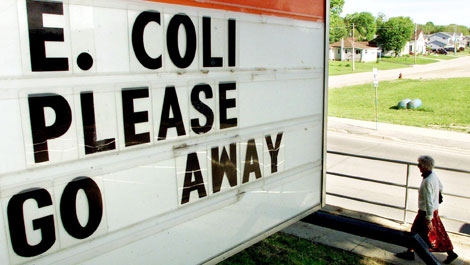
Anyone younger than 20 or 25 will not know this, but two decades ago this spring, the hospital in a small Ontario town suddenly faced a crisis. On May 17, 2000, seven children from a town school arrived at the hospital complaining of cramps and diarrhoea. The next day, 20 students were reported absent from another school in the same town, and on the day following, 33 more youngsters were absent from class.
It didn’t take long for area hospitals to see a trend of patients suffering from gastroenteritis symptoms. When townspeople suggested that the local public utilities commission (PUC) water protection system might be the cause, they got a terse response.
“The town’s drinking water is okay,” said two PUC officials.
Twenty years later, we know that the water in that town’s public well was not safe. It had been contaminated with E. coli, which resulted in the deaths of six people and made over 2,300 people in Walkerton, Ont., horribly sick. The two PUC town officials eventually pleaded guilty to charges of common nuisance.
And in 2002, in the Walkerton Inquiry report, written by Justice Dennis O’Connor, Ontarians learned that a series of critical breakdowns – in communication between the Ministry of the Environment and local health units, random monitoring of water purity, and lack of proper training and certified inspections – proved to be responsible for the sickness and deaths due to water poisoning.
Why am I refreshing our memories of all this today?
Well, you may not have noticed it, but thanks to Toronto Star investigative reporter Moira Welsh, this past week readers learned that the Doug Ford government has quietly gone about changing the way the province holds “the producers of electronics or household hazardous waste accountable for the products they sell.”
In other words, the current Ontario government has decided that the Resource Productivity and Recovery Authority (RPRA), the body that (since 2016) has overseen the safe removal or recycling of potentially hazardous contents in computers, printers, paint and household cleaners, is needless, and worse, a nuisance.
“(Such regulation) makes Ontario a less competitive place to do business,” Environment Minister Jeff Yurek’s office explained to reporter Welsh. The RPRA’s “red tape,” the minister said, “increases costs for consumers.”
Here we go again. First it was the Conservatives’ secret plan to undermine the Oak Ridges Moraine Land Trust (protection of southern Ontario’s drinking water) by opening up the greenbelt to development. Media exposure of that plan, forced the premier to backtrack.
Then, it was the same administration’s changes in environmental policy that drew the attention of the provincial auditor; last month, Bonnie Lysyk announced that among other things, the Conservative government’s climate and environmental policies could never meet Ontario’s 2030 emission reduction targets, and worse, they were “not based on sound evidence or sufficient detail.”
And the policy of dismantlement continues. Whether it was changing the rules for assistance to families who have children with autism, chopping legal-aid funding for already marginalized Ontarians, gutting Toronto’s ward system even as a municipal election was being waged, or scrapping what education regulators have recognized for a generation as the appropriate class size – 22 students – on the pretext that learning under such conditions “creates a more resilient student,” the Ford administration has a phobia about regulation. In my encounters with parents, teachers, boards and even employers, I haven’t heard one person suggest that deregulating class sizes (increasing the ratio of students to teachers) reflects any accepted scientific precept.
No. In the present Ford administration’s manic dash to erase any parliamentary policy or law with Kathleen Wynn’s name attached to it, I believe its ideological paring knife runs the risk of deregulating enough to put Ontario health, life and, yes, even free enterprise in peril. When you take away the rules, you create anarchy, where the strongest survive, but nothing else does.
In the days and weeks that followed Justice Dennis O’Connor’s two-volume Report on the Walkerton Inquiry, back in 2002, I remember reading a small story in the Walkerton weekly. It showed a photograph of a woman pouring water from her kitchen tap for the first time since the contamination, the seven deaths and community-wide illness. She had attended the funerals of neighbours killed by the poisoned water. She had read all 121 of Justice O’Connor’s recommendations.
And she had heard Dr. Murray McQuigge, Walkerton’s medical officer of health, pronounce that new regulations governing the public utility commission had ensured the town’s drinking water was safe again. She admitted she felt some trepidation about abandoning the bottled water she and the rest of the town had lived on for two years. Breathlessly, however, she said she filled her glass with tap water, governed by a reconstituted authority and drank in safety.
Confidence in the services we depend on, comes from trust and transparency, not from secrecy and gamesmanship.